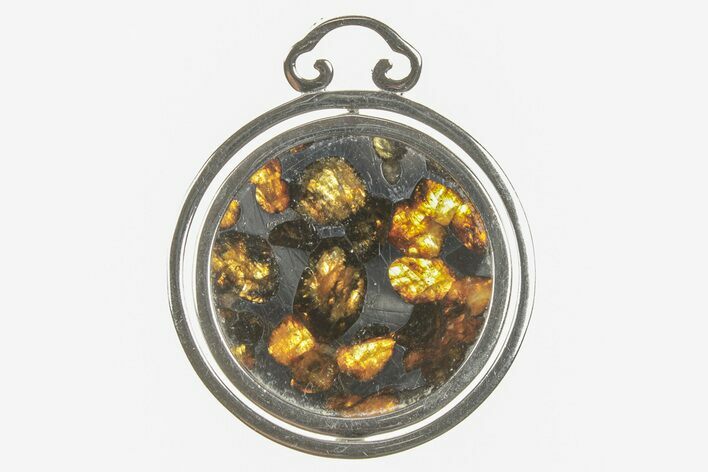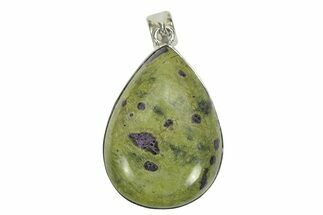This Specimen has been sold.
1.2" Sericho Pallasite Meteorite Pendant In Rotating Frame
This is a 1.2" wide, round Sericho pallasite meteorite pendant in a rotating silver frame. These meteorites fragments found near the village of Habaswein had been known about for decades by camel herders, however they were disregarded until two brothers who were searching for their camels, stumbled upon them. Weeks of excavating ensued following their discovery. This fall site has produced over 2800 kg of the Sericho meteorite since 2016.
The meteorite slice covered by a clear epoxy resin to keep it stable and has been set in a round, 925 silver frame that allows the center to rotate. It is accompanied by a 21.5" long, silver-metallic chain necklace.
The meteorite slice covered by a clear epoxy resin to keep it stable and has been set in a round, 925 silver frame that allows the center to rotate. It is accompanied by a 21.5" long, silver-metallic chain necklace.
About Pallasites
Pallasite meteorites are a class of stony-iron meteorites. They were once believed to have originated at the core-mantle boundary of asteroids that shattered through impacts, but a recent hypothesis is that they are a mixture of core and mantle minerals.
Pallasite meteorites consist of olivine (peridot) crystals surrounded by iron-nickel matrix. Upon acid etching, some pallasites display interweaving structures known as Widmanstätten patterns (or Thomson lines) in the metallic matrix. These structures are iron-nickel alloy crystals, typically kamacite and taenite, that cooled over millions of years in the vacuum of space.
Pallasites are quite rare: only about 200 are known, and only four have had observed falls. This represents less than 0.2% of all classified meteorites!
Pallasite meteorites are a class of stony-iron meteorites. They were once believed to have originated at the core-mantle boundary of asteroids that shattered through impacts, but a recent hypothesis is that they are a mixture of core and mantle minerals.
Pallasite meteorites consist of olivine (peridot) crystals surrounded by iron-nickel matrix. Upon acid etching, some pallasites display interweaving structures known as Widmanstätten patterns (or Thomson lines) in the metallic matrix. These structures are iron-nickel alloy crystals, typically kamacite and taenite, that cooled over millions of years in the vacuum of space.
Pallasites are quite rare: only about 200 are known, and only four have had observed falls. This represents less than 0.2% of all classified meteorites!
TYPE
Pallasite
AGE
LOCATION
Sericho, Isiolo County, Kenya
SIZE
Entire Pendant: 1.2" wide, Meteorite section: .9"
CATEGORY
SUB CATEGORY
ITEM
#249347
 Reviews
Reviews












